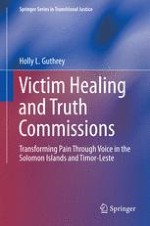2015 | OriginalPaper | Buchkapitel
7. Making Sense of the Findings from Timor-Leste and Solomon Islands
verfasst von : Holly L. Guthrey
Erschienen in: Victim Healing and Truth Commissions
Aktivieren Sie unsere intelligente Suche, um passende Fachinhalte oder Patente zu finden.
Wählen Sie Textabschnitte aus um mit Künstlicher Intelligenz passenden Patente zu finden. powered by
Markieren Sie Textabschnitte, um KI-gestützt weitere passende Inhalte zu finden. powered by
